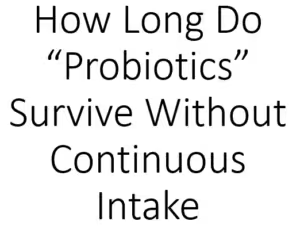Probiotics, often referred to as “good” or “friendly” bacteria, play a crucial role in maintaining gut health. They are live microorganisms that, when consumed in adequate amounts, confer health benefits to the host. These benefits include aiding digestion, boosting the immune system, and even influencing mood and mental health. However, a common question arises: how long do these beneficial bacteria survive in the gut without continuous intake of probiotic supplements or foods?

Survival of Probiotics in the Gut
The survival of probiotics in the gut without continuous intake depends on several factors, including the type of probiotic strain, the individual’s diet, and overall gut health. Generally, probiotics do not permanently colonize the gut. Instead, they transiently pass through the digestive system, exerting their beneficial effects as they go.
- Type of Probiotic Strain: Different strains of probiotics have varying abilities to survive in the gut. For example, strains like Lactobacillus and Bifidobacterium are known to survive longer compared to others. Some strains can persist in the gut for a few days to a few weeks after ingestion, while others may only last a few hours.
- Diet and Lifestyle: The diet and lifestyle of an individual significantly impact the survival of probiotics. A diet rich in prebiotics (non-digestible fibers that feed probiotics) can help sustain the probiotics longer. Foods like garlic, onions, bananas, and whole grains are excellent sources of prebiotics. Additionally, a balanced diet that includes fermented foods like yogurt, kefir, sauerkraut, and kimchi can help maintain a healthy gut microbiome.
- Gut Environment: The existing gut environment also plays a role in how long probiotics can survive. A healthy gut with a diverse microbiome provides a more hospitable environment for probiotics. Conversely, factors like antibiotic use, stress, and poor diet can disrupt the gut microbiome, making it harder for probiotics to survive.
Mechanisms of Probiotic Survival
Probiotics employ several mechanisms to survive in the gut. These include:
- Adhesion to the Gut Lining: Some probiotics can adhere to the mucosal lining of the gut, which helps them stay longer and interact with the host’s cells.
- Competition with Pathogens: Probiotics can compete with harmful bacteria for nutrients and space, which helps them survive and maintain their population.
- Production of Antimicrobial Substances: Certain probiotics produce substances that inhibit the growth of pathogenic bacteria, thereby enhancing their own survival.
Recommended Weekly Intake of Probiotics
To maintain the benefits of probiotics, it is generally recommended to consume them regularly. While there are no official guidelines for weekly intake, many health professionals suggest a daily intake of probiotics. For adults, this typically ranges from 10 to 20 billion colony-forming units (CFUs) per day. This can be achieved through a combination of dietary sources and supplements.
In practical terms, consuming probiotic-rich foods like yogurt, kefir, sauerkraut, kimchi, and other fermented products several times a week can help maintain a healthy level of probiotics in the gut. For those who prefer supplements, following the dosage instructions on the product label or consulting with a healthcare provider is advisable.
Practical Implications
For individuals looking to maintain the benefits of probiotics, it is generally recommended to consume them regularly. This can be achieved through dietary sources or supplements. While some probiotics may survive for a short period without continuous intake, their numbers will gradually decline, and their beneficial effects may diminish over time.
Future Considerations
It’s important to note that our understanding of probiotics and their effects on gut health is continually evolving. Future research may provide new insights into how probiotics interact with the gut microbiome, how long they can survive without continuous intake, and the best ways to incorporate them into our diets. As science advances, recommendations and guidelines may change, offering more personalized and effective approaches to maintaining gut health.
In summary, the survival of probiotics in the gut without continuous intake varies based on the type of strain, diet, and overall gut health. To maximize the benefits of probiotics, it is advisable to include them regularly in your diet through foods or supplements. This ensures a steady supply of these beneficial bacteria, supporting overall gut health and well-being.
